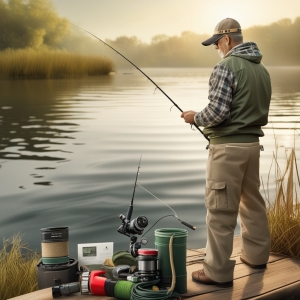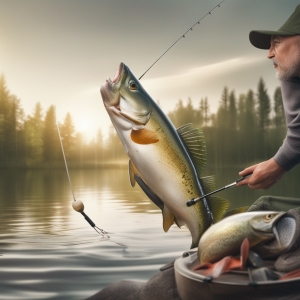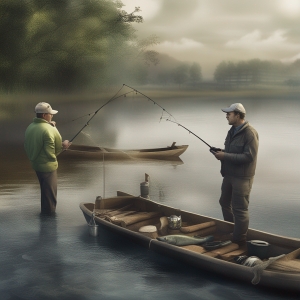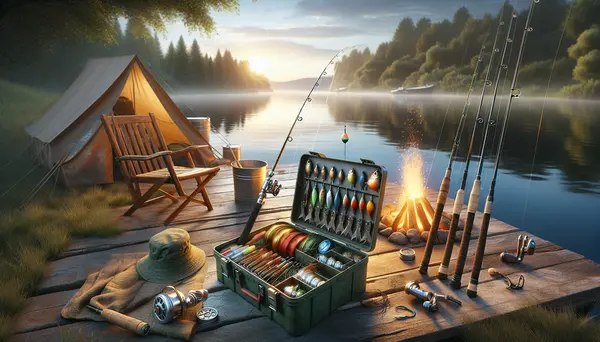Table of Contents:
Fishing for beginners: Tips and tricks for a successful start
Starting out in the world of fishing can feel like diving into the deep end. You're surrounded by a multitude of bait types, rods, reels, and a variety of fishing techniques. The array of options can be overwhelming, but don't let this deter you. Fishing is an enjoyable, rewarding hobby that reaps countless benefits, and it's more accessible than you might think. In this article, we are going to arm you with the essential information you need to make your fishing debut a resounding success. We will be discussing tips, tricks, and equipment recommendations specifically tailored for beginners.
Now, how about we dive right into the heart of the matter? Our key words of guidance for you in this adventure are - **patience**, **preparation**, and **practice**. We'll explain why, and give you actionable tips for each.
Understanding the basics of fishing
The success of your first fishing experience hinges heavily on understanding the fundamental principles. To get started with fishing, you need to familiarize yourself with the basic equipment. Central to your fishing kit are items such as a fishing rod, fishing reels, fishing line, hooks, and bait. Each of these components has a specific purpose and using them effectively requires a certain level of knowledge and skill.
Fishing hooks are used to catch fish by impaling them in the mouth, whereas the fishing line attaches the hook to your fishing rod. Your fishing reel, on the other hand, is the device attached to your fishing rod that allows you to wind your line in and out. Lastly, bait is a crucial element in attracting the fish towards your hook.
Besides the equipment, it's essential to understand various fishing techniques like casting, trolling, and fly-fishing; each perfect for specific situations and types of fish. In addition, knowing the best times to fish, considering factors such as weather conditions and time of day, can significantly increase your success rate.
In a nutshell, understanding these basic concepts sets a strong foundation for your fishing endeavors and increases the chances of a fruitful fishing trip.
Benefits and Drawbacks of Fishing for Beginners
| Pros | Cons |
|---|---|
| Pleasant way to spend time outdoors | Need for patience and quietness may not suit everyone |
| Opportunity to learn about aquatic life | Possibility of not catching anything |
| Provides a sense of achievement when you catch a fish | Requires some initial investment in fishing gear |
| Some fish are good sources of nutrition | Fishing licenses may be required which incur fees |
| Can be enjoyed alone or with friends and family | Can be time-consuming, especially if travel is involved |
The importance of the right equipment

Choosing the right fishing gear is critical to your success as a novice angler. Picking the right materials, understanding how to use them, and regularly maintaining them not only reduces frustration but also ensures a productive and enjoyable experience.
Your choice in fishing rods and reels plays an immense role in your fishing expedition. For beginners, a medium-action rod combined with a spinning reel is often recommended because of its versatility and ease of use. These rods allow for accurate casting and are capable of handling most fish species.
Similarly, your fishing line should be appropriate for the type and size of fish you aim to catch. You should also consider the fishing conditions as they can affect the line's visibility and strength. For instance, a clear fishing line is a good choice for clear waters while braided lines are known for their durability and strength which is advantageous when fishing in rugged conditions.
The proper bait is another key component to catching a particular species of fish. Live baits such as worms or minnows are commonly used and are effective for a wide variety of fishes. However, understanding the feeding habits of your targeted fish can give you an added advantage. For instance, if you’re targeting trout, you might use a replica of their common prey as bait. This is where artificial lures come in handy.
With the right equipment at your disposal, you take the first step towards ensuring a satisfying fishing adventure.
Finding the perfect fishing spot
After equipping yourself with the necessary gear, the next vital step is to locate a suitable fishing spot. The choice of location has a huge impact on your catch rate. It is essential to choose a place where fish are plentiful and feeding. Furthermore, considering the type of fish you aim to catch, be it in freshwater or saltwater environments, can help guide your decision.
Local docks, piers, and pond banks often turn out to be fantastic fishing grounds for beginners due to the frequent presence of stocked fish. However, fishing regulations vary from place to place, so it's always important to check local rules and regulations related to specific waters and fish species before setting out on your fishing adventure.
Further, factors like water depth, temperature, vegetation, and structure, can affect fish behavior and thus, your success in catching them. For instance, fish often shelter under cover such as overhanging trees or man-made structures. Identifying these places can lead you straight to a gold mine of fish.
Bridging the gap between the human world and the aquatic one, fishing locations can be as diverse as the hobby is itself. The best fishing spot could be a crowded pier, a secluded bank of a river, or a popular stretch of coastline — the key is to find a place that works best for your fishing style and desired catch. Remember, the 'perfect spot' might involve some trial and error—yet another reason why patience is a required virtue in this hobby!
Grasping the fishing techniques

Once you have equipped yourself with the essential gear and found a promising fishing spot, it's time to master the art of fishing techniques. Of paramount importance is learning how to cast your line effectively. The key to a good cast is practice and precision. Start practicing your casting in an open area to avoid any obstructions that might tangle your line.
Regular casting involves holding the reel underneath the rod with your index finger extending to press the line against the rod's handle. You then bring the rod backward and then forward in a smooth motion, releasing the line with your finger as you point towards your target. It's simple once you get a hang of it, but it's essential not to rush the process as the wrong move may lead to a twisted fishing line or worse, injury.
Another essential technique to learn is setting the hook. This is the technique used to secure the fish on the hook once it bites. The trick is to wait for the fish to bite, which will be signaled by a tug or pull on your line, then pulling back sharply on your rod will secure the hook in the fish's mouth.
Lastly, reeling in or retrieval is another technique where patience and skill play an important role. When a fish is hooked, reel in slowly, keeping your line tight and maintaining pressure on the fish. If the fish struggles, stop reeling and let it tire itself out before continuing with reeling. Rushing at this stage could potentially lose your catch.
Mastering these techniques, though it may take some time and patience, enhances your experience and boosts your success at fishing.
Adopting the Catch and Release principle
In the realm of ethical angling, the Catch and Release principle plays a crucial role. This practice allows you to enjoy the thrill of the catch while you contribute to the conservation and sustainability of fish populations. It involves promptly releasing the fish back into the water after catching them, minimizing potential harm to the fish.
For beginners, adopting this principle is a fantastic idea, primarily because it promotes conscious, responsible fishing. By releasing the fish you catch, you ensure that they can continue to grow, reproduce, and contribute to the overall health of their ecosystems. It’s a win-win: respecting nature while practicing a beloved recreation.
However, practicing catch and release requires some know-how to ensure the safety and survival of the fish. One important technique is to wet your hands before handling the fish, as dry hands can remove the fish's protective slime layer, making them vulnerable to disease. Also, avoid touching the gills and eyes of the fish, and debarb your hooks to make them easier to remove.
Through the catch and release principle, not only can you improve your angling skills, but you also contribute to maintaining healthy and diverse fish populations. This isn't just beneficial to the ecosystem but to the wider fishing community and future generations of anglers.
Safety Measures and Fishing Ethics

While embarking on your fishing journey, it's crucial to prioritize safety and adhere to ethical fishing standards. Fishing, although enjoyable, can pose some risks. Sharp hooks, unpredictable weather, and rocky terrains are some elements you need to carefully navigate. Always ensure you're equipped with a first aid kit while fishing. Wearing life jackets while fishing near deep waters can save lives. Also, respect for weather patterns and understanding when to call it a day can make a huge difference to your safety.
On the ethics front, catch and release is an approach which ensures the sustainability of fish populations. This involves unhooking and releasing the fish back into the water as gently as possible. In some areas, catch and release is not just ethical but also legal requirement for certain fish species. It's your responsibility to check local regulations for this.
Moreover, it's important to respect your fishing environment. This involves not leaving behind any waste and not causing damage to local flora and fauna. Fishing is a chance to connect with nature, and as fishers, we should strive to protect and preserve the environment we so enjoy.
By maintaining top-level safety measures and adhering to ethical fishing practices, you not only enrich your own fishing experience, but also ensure the continued enjoyment of the sport for future generations.
Conclusion: Embarking on your fishing journey
Now that you're equipped with the basics, your journey into the world of fishing is all set to begin. Remember, every expert was once a beginner, and it's your curiosity and desire to learn that will sketch your course in this new adventure.
With fishing, there's always something new to discover. You'll learn not just about the fish and the equipment but about nature, ecosystems and, most importantly, yourself. Don't be afraid of making mistakes, each one is a step towards becoming a better angler. Embrace your experiences and remember, the joy of fishing lies as much in the journey as it does in the catch.
So get out there, cast your line, and let the world of fishing reel you in. Here's to making waves and catching your first fish!
Common Questions About Starting Fishing
How do I start fishing?
You start fishing by first getting the necessary fishing equipment such as a fishing rod, fishing line, hooks, and bait. You also need a fishing license in many areas, so make sure to check the local regulations.
What is the best bait for beginners?
The best bait for beginners is often live bait such as worms or minnows. These are attractive to a wide variety of fish and are easy to use.
Where is the best place for beginners to fish?
Beginners can start fishing in local ponds, lakes, rivers, or even the sea. The key is to find a place where there are plenty of fish and where you're allowed to fish.
What is the best time to fish?
The best time to fish often depends on the species of fish. Generally, early morning and late evening are productive times because fish are more likely to feed during these times.
Do I need special clothing for fishing?
Special clothing is not necessary, but it can help. Opt for weather-appropriate clothing that you don't mind getting wet or dirty. Also, a hat for sun protection and sunglasses to reduce glare from the water can enhance your fishing experience.







